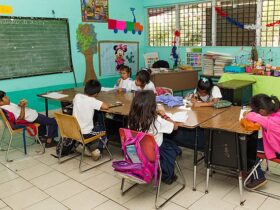
Around a month ago, the 21st iteration of the United Nations Framework Convention on Climate Change Conference of Participants (UNFCCC COP21) in Paris concluded. Shannon Gibson, an international relations professor at the University of Southern California, was a participant in the conference both as a scholar and as a member of civil society. Below are the transcripts of a recent email interview with Glimpse from the Globe about the conference.
GLIMPSE: Why did your research lead you to attend the Paris talks?
GIBSON: I was going as a scholar-activist, but wearing many hats. I went to both follow the talks themselves, but also to research and support the various climate justice groups mobilizing inside and outside the talks in Paris. I was accredited by the Global Justice Ecology Project, a Vermont-based climate justice organization, for the official talks and traveled with a group of like-minded scholars (mostly based out of UCSB) known as the Climate Justice Project.
GLIMPSE: Do you believe that the role civil society plays in influencing international climate talks shifted in the time between Copenhagen and Paris? If so, why?
GIBSON: I think civil society has made a tremendous impact. COP15 was ultimately a failure. States, particularly the United States, had the ability to ignore the global consensus on climate change and notions of climate justice and democracy within the UNFCCC. Therefore, the document that was presented in the end was not only not enough, but was an affront to the process and those most impacted by climate change. Coming in to Paris, the pressure on states was much higher. The United States knew that it could no longer pursue outright unilateralism. It would have to be a global effort with compromises coming from all sides.
GLIMPSE: What were your expectations for COP21 in the months leading up to the event? This can range from how the interplay between non-state actors and state representatives would unfold, to the importance of specific state players, to the potential for overall “success” of the talks. How did your experience in Copenhagen inform these expectations?
GIBSON: Sadly, and I would say rightly, my experiences in Copenhagen led me to having lower expectations for COP21. Going into to COP15, I had such hope. I was a bright-eyed graduate student in my late 20s thinking I was going to see the world changed for the better. And then I watched as the talks fell apart right before my very eyes. It was heartbreaking. A lot of us refer to those weeks after Copenhagen as the “COP15 hangover”.
So I think this time around, I had a better understanding of the structural challenges as well as the power of special interests and businesses in these negotiations. I was pretty convinced we wouldn’t see a legally binding treaty or a lot of movement beyond what states had already committed to in the year/months leading up to the talks.
I can also say, I didn’t place as much hope or importance on these talks as I did with COP15. And I think that’s a good thing. There’s a tendency to cast these meetings as the end all, be all of saving the world. I don’t think that’s accurate. No matter what states do and don’t do, which of course is important, we see everyday that cities, student groups, universities and even companies are doing great things to mitigate climate change, regardless of how much states continue to balk on the issue.
GLIMPSE: How did your experience in Paris match these expectations?
GIBSON: I think short of being able to predict the unfortunate terror events – which had a significant impact on civil society mobilization – I was pretty accurate.
GLIMPSE: What surprised you about Paris? Can you specifically speak about a person whom you met who provided an interesting or new perspective on the talks?
GIBSON: I don’t think much surprised me, but I was very happy to see Naomi Klein there and very active in the media and at activist events. She has been a long time scholar, filmmaker and activist, and is very good at articulating the connections between various movements. She points out that climate change is not just an environmental issue; it is one that is caused by a variety of systemic factors—militarism, imperialism, racism, paternalism and globalization. And civil society should unite around that…because at the end of the day an indigenous person fighting Western corporate encroachment, a labor organizer trying to defend themselves against NAFTA and a women fighting for her rights in the Middle East…have a lot more in common than they may realize.
GLIMPSE: Was there a clear barrier between non-state and state interaction in Paris? Were there certain non-state actors that gained privileges in presenting their expertise/viewpoint to state actors that other NGOs/players did not have? If so, why?
GIBSON: There are always some actors that have more access and influence than others. States always trump NGOs. The negotiations are set around that notion. Civil Society Organizations get to “observe”. And more and more we’re seeing their access increasingly diminished and restricted. And even within civil society, there are some groups…the 350.orgs, Greenpeace, Friends of the Earth, that will get more lip service or access compared to say small grassroots or Indigenous Peoples organizations from the Global South.
GLIMPSE: The environmental NGO community provided multiple responses to the Paris Agreement—some positive, some negative. Looking ahead ten or fifteen years from now, how do you think the environmental NGO community will view this agreement? Will it be seen as a watershed, a Kyoto 2.0 or something else?
GIBSON: It’s always hard to predict in this sense, but I think the critical voices are important ones. The bottom line is that the states set a target of 2.0 degrees with an ambition of 1.5 degrees Celsius, yet their own emission reduction commitments simply do not get us there. They will lead us to at least a 3.0 degrees increase if not more.
GLIMPSE: Finally, from your point of view, were the talks a success? What does success look like in the context of climate talks? Could we reasonably expect anything more to come from them?
GIBSON: In terms of how I see success…a legally binding treaty that recognizes historical responsibility and averts catastrophic climate change…no. But the talks are not over. They will continue this year in Morocco and with next major review in 2018. Also, there’s a ton of action on the ground that goes on outside these talks. That’s why less and less I think a huge emphasis should be put on them.
From the divestment movement that’s sweeping the nation and the world to the banning of bottle water and plastic bags, we’re seeing traction at so many levels. People understand the threat and are beginning to take action regardless of a states’ inability or unwillingness to do so.
The views expressed by the author do not necessarily reflect those of the Glimpse from the Globe staff, editors or governors.





